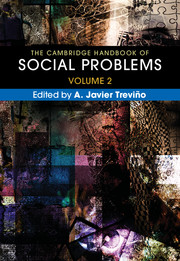Book contents
- The Cambridge Handbook of Social Problems
- The Cambridge Handbook of Social Problems
- Copyright page
- Contents
- About the Contributors
- Introduction
- Part I Problems Related to Health, Safety, and Security
- Part II Problems Related to Crime and Violence
- Chapter 12 The Problem of Crime
- Chapter 13 Corporate Malfeasance as a Social Problem
- Chapter 14 The Construction of School Bullying as a Social Problem
- Chapter 15 Rampage School Shootings
- Chapter 16 Understanding Sexual Violence: The Role of Causal and Precipitating Factors in Sexual Offending
- Chapter 17 Critical and Intersectional Understandings of Campus Sexual Assault as a Social Problem
- Chapter 18 Child Abuse and Neglect
- Chapter 19 Family Violence
- Chapter 20 Juvenile Violence
- Chapter 21 Gangs and Gang Violence
- Chapter 22 State Violence
- Chapter 23 Hate Crime
- Chapter 24 Police Brutality
- Chapter 25 Capital Punishment/Death Penalty
- Chapter 26 Wrongful Convictions: Comparative Perspectives
- Part III Problems of Global Impact
- Index
- References
Chapter 26 - Wrongful Convictions: Comparative Perspectives
from Part II - Problems Related to Crime and Violence
Published online by Cambridge University Press: 16 March 2018
- The Cambridge Handbook of Social Problems
- The Cambridge Handbook of Social Problems
- Copyright page
- Contents
- About the Contributors
- Introduction
- Part I Problems Related to Health, Safety, and Security
- Part II Problems Related to Crime and Violence
- Chapter 12 The Problem of Crime
- Chapter 13 Corporate Malfeasance as a Social Problem
- Chapter 14 The Construction of School Bullying as a Social Problem
- Chapter 15 Rampage School Shootings
- Chapter 16 Understanding Sexual Violence: The Role of Causal and Precipitating Factors in Sexual Offending
- Chapter 17 Critical and Intersectional Understandings of Campus Sexual Assault as a Social Problem
- Chapter 18 Child Abuse and Neglect
- Chapter 19 Family Violence
- Chapter 20 Juvenile Violence
- Chapter 21 Gangs and Gang Violence
- Chapter 22 State Violence
- Chapter 23 Hate Crime
- Chapter 24 Police Brutality
- Chapter 25 Capital Punishment/Death Penalty
- Chapter 26 Wrongful Convictions: Comparative Perspectives
- Part III Problems of Global Impact
- Index
- References
Summary
Wrongful conviction becomes a social problem when innocence consciousness arises, meaning that a significant number of people view miscarriages of justice as caused by correctible systemic factors, and not as inevitable failures of courts. The term “wrongful conviction” encompasses procedurally flawed court convictions and the convictions of factually innocent defendants (i.e., false convictions). There is no definitive way to measure the incidence of false convictions, but American experts estimate plausible rates of from 1 to 3 percent, which translates to tens of thousands falsely convicted each year. Three case studies – the United States, England, and China – demonstrate that innocence consciousness occurred at different times, subject to different social stimuli, leading to different citizen and governmental responses in each country. Wrongful convictions are now viewed as a social problem globally. Wrongful conviction research, conducted mostly by psychologists and lawyers, would benefit from studies by social scientists.
Information
- Type
- Chapter
- Information
- The Cambridge Handbook of Social Problems , pp. 449 - 472Publisher: Cambridge University PressPrint publication year: 2018
